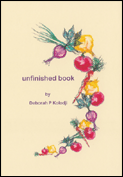
|
Christopher T. George is co-editor of Loch Raven Review. George was born in Liverpool, England in 1948 and now
lives in Baltimore, Maryland, near Johns Hopkins University, with his wife Donna and two cats. Chris works full-time as
a medical editor in Washington, DC. He has been writing and publishing poetry since he attended Loyola College,
Baltimore, and studied with Sister Maura Eichner at the College of Notre Dame, as well as with poets Elliot Coleman
and Marion Buchman. His poems have appeared in numerous publications in the United States and Great Britain. He is
also a published historian and a lyricist for a new musical,
Jack-The Musical, about Jack the Ripper.
George also is the Editor of
Desert Moon Review and an editor at
Writer’s Block Poetry Workshop.
Deborah P. Kolodji lives in Temple City, California. She is the editor of Amaze: The Cinquain Journal and the Moderator of the CinquainPoets e-mail list. She is a member of the Haiku Society of America, the Science Fiction Poetry Association and the California State Poetry Society. Her work has appeared in Modern Haiku, Frogpond, Eclectica, Gin Bender Poetry Review, Strange Horizons, Astropoetica, Scifaikuest, Haiku Harvest, and many other places. |
Fall 2006 Table of Contents - Vol. II, No. 2 |
|
|
Christopher T. George
Deborah P. Kolodji, unfinished book, Shadows Ink Publications, ISBN 0-932447-55-5, 22 pages, 2006, $6.95.
In this slim but entertaining chapbook, Deborah P. Kolodji, editor and co-founder of Amaze: The Cinquain Journal and a member of the Haiku Society of America, proves herself to be equally adept at writing longer poems as the five-line cinquains (syllable count 2-4-6-8-2) and the three-line haikus (traditionally 5-7-5) that mostly characterize the book. The attractive cover of unfinished book shows an array of kitchen vegetables, beets, tomatoes, onions, etc., set against a pale yellow background, and the opening sequence of three haikus is in keeping with the mood of that cover: unfinished book— a vegetable garden not yet planted birth announcement an unopened packet of marigolds teenage giggles three pony packs of impatiens —an engaging opening, entirely consistent with the earthy sensuality that the poet explores throughout the book, as in the following cinquain: Gingko in November gingko yellow leaf fans waving autumn goodbye hitchhiking on wind gusts dropping silent. I noted in the beginning that Ms. Kolodji is as proficient in longer forms as in those short forms. Nowhere is this better demonstrated than in the moving poems, “Testament” and “Infidelity”—the former about the death of a loved one and the latter about a nasty divorce. “Infidelity” also nicely ties in with the onions on the cover of the book, the beginning of the poem being: There is a deli across from the the courthouse serving six inch submarine sandwiches the onions always want to make me cry like the husband I divorced today. . . The ending of the poem reads as follows: and each paper became one more skin to peel away, the round illusion slowly shrinking, a perfect marriage becoming memory — once more these onions hurt my eyes and I’m bleeding tears, pouring salt all over my rye bread only today the order was no onions. unfinished book is a sensitive collection of mainly short form poems but with three longer poems that show the poet has as much great potential as an original voice in the long form arena as in the short. © Christopher T. George |
|
